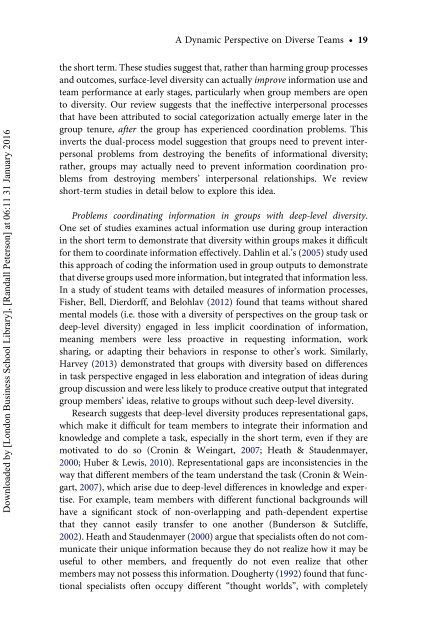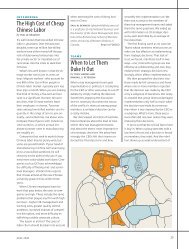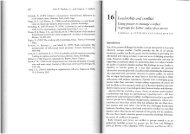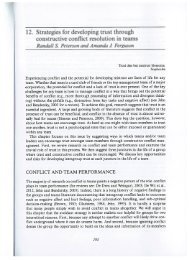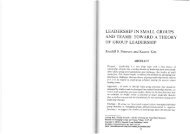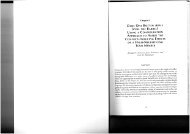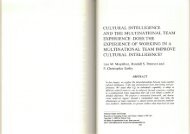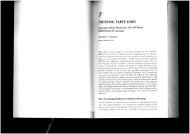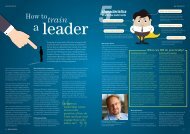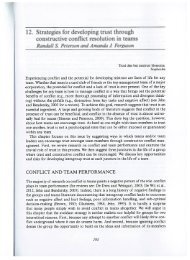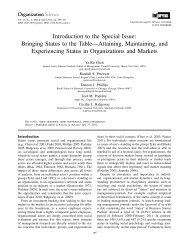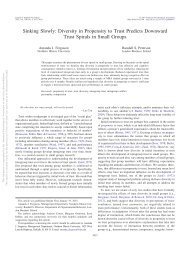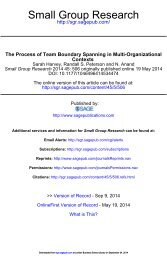A Dynamic Perspective on Diverse Teams: Moving From The Dual Process Model to A Dynamic Coordination-Based Model of Diverse Team Performance - Kannan Srikanth, Sarah Harvey & Randall Peterson
The existing literature on diverse teams suggests that diversity is both helpful to teams in making more information available and encouraging creativity and damaging to teams in reducing cohesion and information sharing. Thus the extant literature suggests that diversity within teams is a double-edged sword that leads to both positive and negative effects simultaneously.
The existing literature on diverse teams suggests that diversity is both helpful to teams in making more information available and encouraging creativity and
damaging to teams in reducing cohesion and information sharing. Thus the
extant literature suggests that diversity within teams is a double-edged sword
that leads to both positive and negative effects simultaneously.
Create successful ePaper yourself
Turn your PDF publications into a flip-book with our unique Google optimized e-Paper software.
A <str<strong>on</strong>g>Dynamic</str<strong>on</strong>g> <str<strong>on</strong>g>Perspective</str<strong>on</strong>g> <strong>on</strong> <strong>Diverse</strong> <strong><strong>Team</strong>s</strong> † 19<br />
Downloaded by [L<strong>on</strong>d<strong>on</strong> Business School Library], [<strong>Randall</strong> Peters<strong>on</strong>] at 06:11 31 January 2016<br />
the short term. <strong>The</strong>se studies suggest that, rather than harming group processes<br />
and outcomes, surface-level diversity can actually improve informati<strong>on</strong> use and<br />
team performance at early stages, particularly when group members are open<br />
<strong>to</strong> diversity. Our review suggests that the ineffective interpers<strong>on</strong>al processes<br />
that have been attributed <strong>to</strong> social categorizati<strong>on</strong> actually emerge later in the<br />
group tenure, after the group has experienced coordinati<strong>on</strong> problems. This<br />
inverts the dual-process model suggesti<strong>on</strong> that groups need <strong>to</strong> prevent interpers<strong>on</strong>al<br />
problems from destroying the benefits <strong>of</strong> informati<strong>on</strong>al diversity;<br />
rather, groups may actually need <strong>to</strong> prevent informati<strong>on</strong> coordinati<strong>on</strong> problems<br />
from destroying members’ interpers<strong>on</strong>al relati<strong>on</strong>ships. We review<br />
short-term studies in detail below <strong>to</strong> explore this idea.<br />
Problems coordinating informati<strong>on</strong> in groups with deep-level diversity.<br />
One set <strong>of</strong> studies examines actual informati<strong>on</strong> use during group interacti<strong>on</strong><br />
in the short term <strong>to</strong> dem<strong>on</strong>strate that diversity within groups makes it difficult<br />
for them <strong>to</strong> coordinate informati<strong>on</strong> effectively. Dahlin et al.’s (2005) study used<br />
this approach <strong>of</strong> coding the informati<strong>on</strong> used in group outputs <strong>to</strong> dem<strong>on</strong>strate<br />
that diverse groups used more informati<strong>on</strong>, but integrated that informati<strong>on</strong> less.<br />
In a study <strong>of</strong> student teams with detailed measures <strong>of</strong> informati<strong>on</strong> processes,<br />
Fisher, Bell, Dierdorff, and Belohlav (2012) found that teams without shared<br />
mental models (i.e. those with a diversity <strong>of</strong> perspectives <strong>on</strong> the group task or<br />
deep-level diversity) engaged in less implicit coordinati<strong>on</strong> <strong>of</strong> informati<strong>on</strong>,<br />
meaning members were less proactive in requesting informati<strong>on</strong>, work<br />
sharing, or adapting their behaviors in resp<strong>on</strong>se <strong>to</strong> other’s work. Similarly,<br />
<strong>Harvey</strong> (2013) dem<strong>on</strong>strated that groups with diversity based <strong>on</strong> differences<br />
in task perspective engaged in less elaborati<strong>on</strong> and integrati<strong>on</strong> <strong>of</strong> ideas during<br />
group discussi<strong>on</strong> and were less likely <strong>to</strong> produce creative output that integrated<br />
group members’ ideas, relative <strong>to</strong> groups without such deep-level diversity.<br />
Research suggests that deep-level diversity produces representati<strong>on</strong>al gaps,<br />
which make it difficult for team members <strong>to</strong> integrate their informati<strong>on</strong> and<br />
knowledge and complete a task, especially in the short term, even if they are<br />
motivated <strong>to</strong> do so (Cr<strong>on</strong>in & Weingart, 2007; Heath & Staudenmayer,<br />
2000; Huber & Lewis, 2010). Representati<strong>on</strong>al gaps are inc<strong>on</strong>sistencies in the<br />
way that different members <strong>of</strong> the team understand the task (Cr<strong>on</strong>in & Weingart,<br />
2007), which arise due <strong>to</strong> deep-level differences in knowledge and expertise.<br />
For example, team members with different functi<strong>on</strong>al backgrounds will<br />
have a significant s<strong>to</strong>ck <strong>of</strong> n<strong>on</strong>-overlapping and path-dependent expertise<br />
that they cannot easily transfer <strong>to</strong> <strong>on</strong>e another (Bunders<strong>on</strong> & Sutcliffe,<br />
2002). Heath and Staudenmayer (2000) argue that specialists <strong>of</strong>ten do not communicate<br />
their unique informati<strong>on</strong> because they do not realize how it may be<br />
useful <strong>to</strong> other members, and frequently do not even realize that other<br />
members may not possess this informati<strong>on</strong>. Dougherty (1992) found that functi<strong>on</strong>al<br />
specialists <strong>of</strong>ten occupy different “thought worlds”, with completely


